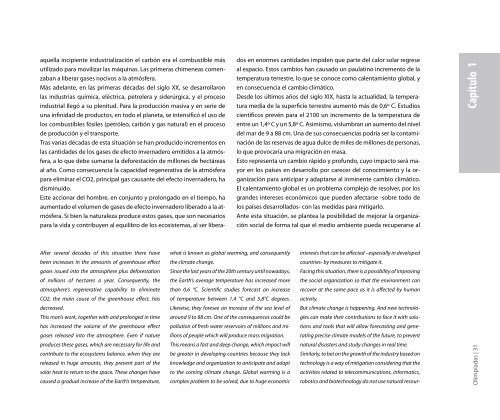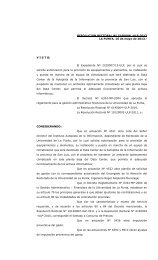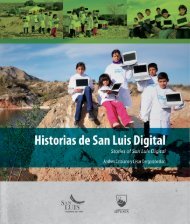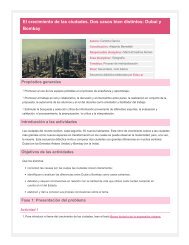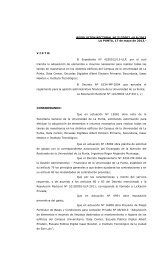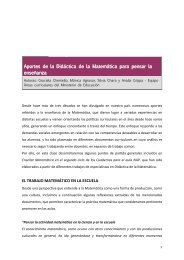e-Book PDF - Universidad de La Punta (ULP)
e-Book PDF - Universidad de La Punta (ULP)
e-Book PDF - Universidad de La Punta (ULP)
- No tags were found...
Create successful ePaper yourself
Turn your PDF publications into a flip-book with our unique Google optimized e-Paper software.
aquella incipiente industrialización el carbón era el combustible másutilizado para movilizar las máquinas. <strong>La</strong>s primeras chimeneas comenzabana liberar gases nocivos a la atmósfera.Más a<strong>de</strong>lante, en las primeras décadas <strong>de</strong>l siglo XX, se <strong>de</strong>sarrollaronlas industrias química, eléctrica, petrolera y si<strong>de</strong>rúrgica, y el procesoindustrial llegó a su plenitud. Para la producción masiva y en serie <strong>de</strong>una infinidad <strong>de</strong> productos, en todo el planeta, se intensificó el uso <strong>de</strong>los combustibles fósiles (petróleo, carbón y gas natural) en el proceso<strong>de</strong> producción y el transporte.Tras varias décadas <strong>de</strong> esta situación se han producido incrementos enlas cantida<strong>de</strong>s <strong>de</strong> los gases <strong>de</strong> efecto inverna<strong>de</strong>ro emitidos a la atmósfera,a lo que <strong>de</strong>be sumarse la <strong>de</strong>forestación <strong>de</strong> millones <strong>de</strong> hectáreasal año. Como consecuencia la capacidad regenerativa <strong>de</strong> la atmósferapara eliminar el CO2, principal gas causante <strong>de</strong>l efecto inverna<strong>de</strong>ro, hadisminuido.Este accionar <strong>de</strong>l hombre, en conjunto y prolongado en el tiempo, haaumentado el volumen <strong>de</strong> gases <strong>de</strong> efecto inverna<strong>de</strong>ro liberado a la atmósfera.Si bien la naturaleza produce estos gases, que son necesariospara la vida y contribuyen al equilibro <strong>de</strong> los ecosistemas, al ser liberadosen enormes cantida<strong>de</strong>s impi<strong>de</strong>n que parte <strong>de</strong>l calor solar regreseal espacio. Estos cambios han causado un paulatino incremento <strong>de</strong> latemperatura terrestre, lo que se conoce como calentamiento global, yen consecuencia el cambio climático.Des<strong>de</strong> los últimos años <strong>de</strong>l siglo XIX, hasta la actualidad, la temperaturamedia <strong>de</strong> la superficie terrestre aumentó más <strong>de</strong> 0,6º C. Estudioscientíficos prevén para el 2100 un incremento <strong>de</strong> la temperatura <strong>de</strong>entre un 1,4º C y un 5,8º C. Asimismo, vislumbran un aumento <strong>de</strong>l nivel<strong>de</strong>l mar <strong>de</strong> 9 a 88 cm. Una <strong>de</strong> sus consecuencias podría ser la contaminación<strong>de</strong> las reservas <strong>de</strong> agua dulce <strong>de</strong> miles <strong>de</strong> millones <strong>de</strong> personas,lo que provocaría una migración en masa.Esto representa un cambio rápido y profundo, cuyo impacto será mayoren los países en <strong>de</strong>sarrollo por carecer <strong>de</strong>l conocimiento y la organizaciónpara anticipar y adaptarse al inminente cambio climático.El calentamiento global es un problema complejo <strong>de</strong> resolver, por losgran<strong>de</strong>s intereses económicos que pue<strong>de</strong>n afectarse -sobre todo <strong>de</strong>los países <strong>de</strong>sarrollados- con las medidas para mitigarlo.Ante esta situación, se plantea la posibilidad <strong>de</strong> mejorar la organizaciónsocial <strong>de</strong> forma tal que el medio ambiente pueda recuperarse alCapítulo 1After several <strong>de</strong>ca<strong>de</strong>s of this situation there havebeen increases in the amounts of greenhouse effectgases issued into the atmosphere plus <strong>de</strong>forestationof millions of hectares a year. Consequently, theatmosphere’s regenerative capability to eliminateCO2, the main cause of the greenhouse effect, has<strong>de</strong>creased.This man’s work, together with and prolonged in timehas increased the volume of the greenhouse effectgases released into the atmosphere. Even if natureproduces these gases, which are necessary for life andcontribute to the ecosystems balance, when they arereleased in huge amounts, they prevent part of thesolar heat to return to the space. These changes havecaused a gradual increase of the Earth’s temperature,what is known as global warming, and consequentlythe climate change.Since the last years of the 20th century until nowadays,the Earth’s average temperature has increased morethan 0,6 °C. Scientific studies forecast an increaseof temperature between 1,4 °C and 5,8°C <strong>de</strong>grees.Likewise, they foresee an increase of the sea level ofaround 9 to 88 cm. One of the consequences could bepollution of fresh water reservoirs of millions and millionsof people which will produce mass migration.This means a fast and <strong>de</strong>ep change, which impact willbe greater in <strong>de</strong>veloping countries because they lackknowledge and organization to anticipate and adaptto the coming climate change. Global warming is acomplex problem to be solved, due to huge economicinterests that can be affected –especially in <strong>de</strong>velopedcountries- by measures to mitigate it.Facing this situation, there is a possibility of improvingthe social organization so that the environment canrecover at the same pace as it is affected by humanactivity.But climate change is happening. And new technologiescan make their contributions to face it with solutionsand tools that will allow forecasting and generatingprecise climate mo<strong>de</strong>ls of the future, to preventnatural disasters and study changes in real time.Similarly, to bet on the growth of the industry based ontechnology is a way of mitigation consi<strong>de</strong>ring that theactivities related to telecommunications, informatics,robotics and biotechnology do not use natural resour-Olimpíadas | 31


